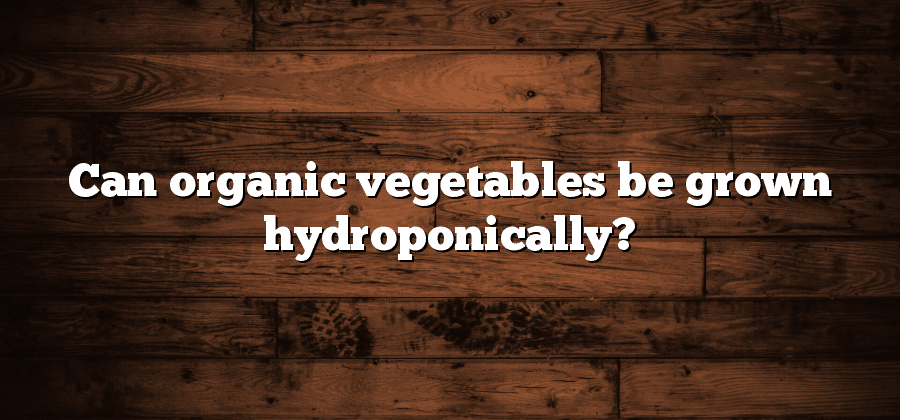Benefits of Growing Organic Vegetables Hydroponically
Hydroponic systems have gained popularity among organic farmers as a sustainable and efficient method of vegetable cultivation. One of the key benefits of growing organic vegetables hydroponically is the ability to control and optimize growing conditions. In traditional soil-based methods, factors such as the quality of the soil, weather conditions, and pests can significantly affect crop yield and quality. However, with hydroponics, farmers can have complete control over the nutrient levels, pH balance, and water quality, creating ideal conditions for plant growth.
Furthermore, growing organic vegetables hydroponically can lead to higher yields and faster growth rates compared to traditional methods. In a hydroponic system, plants have direct access to a nutrient-rich solution, ensuring that they receive the necessary elements for healthy growth. As a result, plants can allocate more energy towards growth and development, leading to larger and more abundant crops. Additionally, hydroponic systems often use less water compared to traditional farming methods, making them more environmentally friendly and sustainable in the long run.
Overall, the benefits of growing organic vegetables hydroponically are evident – greater control over growing conditions, higher yields, faster growth rates, and water efficiency. As the demand for organic produce continues to rise, hydroponics presents itself as a valuable solution for farmers looking to meet these growing consumer needs while embracing sustainable and efficient practices.
Challenges of Growing Organic Vegetables Hydroponically
There are several challenges that growers may face when growing organic vegetables hydroponically. One of the main challenges is ensuring the proper balance of nutrients in the hydroponic system. Organic nutrient solutions can be more difficult to manage compared to synthetic ones, as they can be less precise and require careful monitoring to avoid deficiencies or excesses. This challenge is particularly important for organic growers, who are committed to using organic inputs and avoiding synthetic fertilizers.
Another challenge is maintaining the ideal soilless conditions in the hydroponic system. Without using soil as a growing medium, growers must carefully control factors such as pH, temperature, and oxygen levels to promote plant growth and prevent nutrient deficiencies or disease outbreaks. This requires regular monitoring and adjustments to ensure that the plants have the optimal conditions for growth. Additionally, preventing the buildup of salts and mineral residues in the nutrient solution can be challenging, as they can negatively impact plant health and productivity.
Understanding Hydroponic Systems for Organic Vegetable Cultivation
Hydroponic systems offer an innovative method for cultivating organic vegetables in a controlled environment. With the absence of soil, hydroponics proves to be an efficient way to grow plants, yet requires a thorough understanding of the system to ensure successful organic vegetable cultivation.
One of the key components of a hydroponic system is the growing medium, which replaces traditional soil. Commonly used mediums include rockwool, perlite, and coco coir. These mediums provide support for the roots and hold the nutrient solution needed for plant growth. Additionally, the hydroponic system requires a nutrient reservoir, which consists of a water and nutrient solution that is pumped into the growing medium. This solution is carefully balanced to provide the necessary nutrients for the organic vegetables to thrive. Overall, understanding the different components and their functions within a hydroponic system is essential for organic vegetable cultivation.
Organic Nutrient Solutions for Hydroponic Farming
Hydroponic farming provides a unique opportunity for organic vegetable cultivation without the use of traditional soil. Instead, nutrient solutions are used to provide plants with the essential elements they need for growth. These organic nutrient solutions consist of various compounds and substances that mimic natural soil conditions and ensure optimal plant health.
One of the key components of organic nutrient solutions is the use of organic fertilizers. These fertilizers are derived from natural sources such as plant and animal byproducts. They are rich in nutrients like nitrogen, phosphorus, and potassium, which are essential for plant growth. Organic fertilizers not only provide plants with the necessary nutrients but also improve soil structure, enhance microbial activity, and promote nutrient cycling. This ensures that the plants receive a well-balanced and comprehensive supply of essential elements for their growth and development.
Another crucial aspect of organic nutrient solutions is the incorporation of organic amendments. These amendments, such as compost or vermicompost, contribute to the overall fertility of the nutrient solution. They add organic matter to the solution, increasing its nutrient-holding capacity and improving plant nutrient uptake. Furthermore, organic amendments enhance soil microbial activity, creating a balanced and sustainable environment for the plants.
Maintaining Soilless Organic Conditions in Hydroponics
In hydroponic systems, maintaining soilless organic conditions is crucial for the successful cultivation of organic vegetables. One key aspect of this is the use of organic nutrient solutions. Unlike traditional soil-based agriculture where plants obtain nutrients from the soil, hydroponics relies on nutrient solutions that are mixed with water. These solutions contain essential nutrients that are readily available to the plants, ensuring their optimal growth and development.
To maintain soilless organic conditions, it is essential to use organic nutrient solutions that are free from synthetic chemicals and genetically modified organisms (GMOs). The nutrient solutions should be composed of natural, organic ingredients such as fish emulsion, seaweed extracts, and compost teas. These organic sources provide a wide range of nutrients in a form that is easily absorbed by the plants, promoting their overall health and productivity. Furthermore, organic nutrient solutions help to enhance the flavor, aroma, and nutritional value of the vegetables, making them more desirable to consumers who prioritize organic produce.






